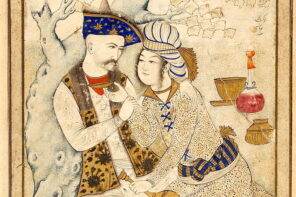Yesterday, one of the many guests at the weekend retreat asked me to pray for her and her three children when I am in Makkah. Now, I have to say here, I don’t even know this woman’s name. But then she said something that really struck me. She said people often ask those who will be making hajj to pray for them. “Then you wonder, how will you remember all of those who ask?” She had the same request before she went to hajj.
But you will remember, she said. Because when you are spending the day on Mt. Arafat, and you spread your hands open to call upon Allah, “the names come back to you as if you are reading the list upon a script.” She held her hands shoulder high, palms up to the heavens in the Muslim position of supplication. I could “see” what she meant, then and there, and I stopped worrying that I would make a promise and then forget this unnamed woman and her three children.
I’ve collected stories from the hajj experience for many many years. Now I prepare to have my own to tell. Four years ago, one of the members of this community went for hajj with her husband and brought him back in a coffin. I’ve never heard a more peaceful story of losing one’s life partner, but there you go. Things do happen out of the ordinary, I suppose. It is this idea, this out of the ordinary that propels our understanding of what is known as “the night of power.”
The whole surah with that title, Laylatul Qadari, is worth quoting:
Indeed, “We” have brought it down on the night of power
And, what will explain to you, what the night of power is?
The night of power is better than a thousand months
The angels and the Ruh come down in it
with the permission of their Lord, for every matter
(They answer with) salaam… Until the dawning of fajr.
This is sorta like the Islamic version of the biblical, “Ask and you shall receive.”
Here the salaam (“for every matter”) is: every matter that you bring forth will be approved, so to speak. And the Qur’an says elsewhere, “Allah hears (and accepts) the call of all who call to Her. So call.” I use the word “call” as a more literal translation of du’a; the Arabic word for personal supplication, what in English we mean when we say “prayer.”
I use the English word “prayer” for the word salah in Arabic, which is actually more like worship in its prescribed formality. But what most people mean when they say “pray for me” is “make du’a for me.” And what “matters” are being referred to in this surah are those matters that we call upon Allah to assist us with. So, the general interpretation given is that on this night, all your prayers, or all your du’a, will be answered.
Now, let me be honest. I am not big on this idea of God as the fulfiller of our requisition lists. I won’t dwell overly long on this, but at least I’ll put it out there. I don’t just reduce Allah to my staff assistant who must respond to my every whim. I have this idea like Rabi’ah al-Adawiyyah, the most famous female Sufi in Islamic history. When she was sick or in terrible impoverishment, her contemporaries would question her why she did not pray (make du’a) to Allah for some relief.
Her response to her contemporaries is relevant here. She said, “Allah not only knows my condition, but is the One in Whose decree, all conditions occur. It would be arrogant of me to ask Him to relieve me from this condition. If She sees fit to alleviate it, then nothing and no one would be able to hold back that decree.” This is perhaps the ultimate expression of trust, or tawakkul ‘ala-Allah. I trust that I am in the condition that Allah wants me to be in, you know, the “everything happens for a reason” condition. So, it’s best to be patient even if it is not to our liking or personal comfort.
This is a pretty tall order, I have to be honest. So fortunately there are also more moderate responses throughout Muslim literature and lore. On the other side, in fact, is the Hadith or saying of the Prophet about “calling upon Allah” or making du’a, which is oh so sweet, “Allah loves to be asked…”
I try to stay in a balance between the two: tawakkul ‘ala Allah, trust that Allah knows my conditions and that if these are stressful then She will grant the relief I need, when I need it most. And yet, I try remembering to humble myself before the throne of the All mighty, the Bestower of favors, and go right on ahead and ask for what I want. That too shows love and trust. I trust that Allah will bring some repose, or grant a favor.
I also have a little bit of concern over that: “be careful what you pray for.” Sometimes the consequences of one prayer’s answer are more troubles than you were facing. So, better to be prudent. I used to have a sticker in my car that I think sums it up, “Oh Allah grant me the most benevolent outcome.” This is the idea behind the special prayer worship called istikharah. Again, no details, but the word itself means asking for the best outcome, even as it is attached to an elaborate formula of ritual request.
In another entry I had mentioned that I would come back to explain how the Qur’an could be revealed over 23 years and yet, here, and in the verses that command us to fast for the month of Ramadan, we are told that the Qur’an came down in this month, or in a single (albeit powerful) night. What kind of math is that?
This is a cosmological or eschatological matter, a matter of theology, so bear with me as I try to simplify it. We have a very good record of the text of the Qur’an that we hold in our hands, in a written form, as the record of a revelatory experience which took place over the last 23 years in the life of the Prophet Muhammad (saw). We also have this surah and verses that say things like that the Qur’an was brought down in the month of Ramadan.
The mediation comes, I think, in those passages that distinguish between the “book” and the sacred scripture: al-Lawh-al Mahfuz. The sacred scripture is in a form of primordial language, or pre-lingual. It is the Essence of the phenomena of God’s communication with us human beings. But this particular text in “clear Arabic,” that was preserved by oral transmission in the memories of believers as well as recorded, and which we now can hold it in our hands, that is what unfolded over a period of 23 years. It is the trace we can hold from the sacred scripture, which some say came “down” from Allah to the lower heavens, before unfolding in 23 years to the Prophet.
Anyway, traditions have it that one of the last odd nights of Ramadan is the night of Power, and part of the ten day i’tikaf is to be in a spiritual state of readiness for this auspicious occasion. But there is no certainty which night it is because of some mess up from the companions at the time when the Prophet intended to tell them which night, and it was forgotten. So, like with the actual sighting of the new moon, I put this down to the place where we have to be really really on top of things and cannot just put in a requisition to get it filled.
Still, last night being the 27th night, I tried to put in the extra effort by returning to the mosque after midnight. I had no major epiphany and did not manage to do the one thing I had hoped to do on a practical level—and that was complete the remaining few parts of the Qur’an. Just to have that sense of accomplishment. I guess I can say, I did not get a lightbulb moment. Neither the grandiose kind of “experiencing” the power of Laylatul Qadri, or the pragmatic kind of a job well done.
Our weekend retreat is done, most of the guests have returned to their regular lives and I am still here with more modest plans for the last few days. This will give me more time to complete my reading even as I will resume my solitary suhur. It’s a long month. But actually, who knows? Maybe some unfolding has already begun, that I cannot see, waiting for the right time to be made manifest. Nope, not every night is better than a thousand months, but I can be patient. In a few days the queen will depart and already the steps have begun for preparing to meet the king: the hajj.




